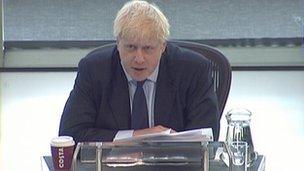Boris Johnson quizzed by London Assembly
- Published

The London Assembly has questioned Boris Johnson for the first time since his re-election.
But anyone expecting a significant change of mood or even the odd surprise would have been disappointed.
Normal service - or rather normal hostility - was quickly resumed across the chamber.
Conservative London Mayor Mr Johnson confirmed, as expected, that he wanted the economy to be his focus, at least for now.
He would, he said, deliver 200,000 jobs over the next four years, preside over continuing investment in transport and attempt to keep building affordable new homes.
But it was a spectacle which suffered from a lack of focus, with many of the arguments echoes of the recent election campaign.
For Labour, it felt a little like skirmishes being fought deep in the jungle long after the war has been declared at an end (and lost) - the gripes being familiar ones over fare rises, police numbers, broken manifesto promises and so on.
Early signs
Their time will surely come again - but that time is not quite now.
This was perhaps inevitable until there is more clarity about the mayor's intentions over the next four years. There is no detailed new mayoral agenda for members to get their teeth into yet.
That did not prevent some early signs emerging of where the scrutiny is likely to be focused in future.
Newly-elected members of the assembly managed to make an immediate mark - visibly unencumbered by the City Hall fatigue or Boris-blindness which may have set in elsewhere in the ranks.
The Liberal Democrat Stephen Knight once led Richmond Council, in south-west London. Labour's Andrew Dismore is a former MP for Hendon, in north-west London.
They bounded in with the exuberance of puppies, strewing the mayor's jobs pledges around the chamber like bits of tissue paper.
Was the mayor promising thousands of new jobs building houses or merely the extension or continuation of existing jobs building houses, asked Mr Knight.
How many of the 200,000 new jobs promised over the next four years would go to the long-term young unemployed, asked Mr Dismore. As many as possible, said the mayor.
Tougher stance
Another new Labour man, Tom Copley, pushed the mayor on what he was going to do to mitigate the effects of the housing benefit cap in London. Housing charity Shelter has recently warned again of the impact of the changes on the capital's social make-up.
Discussions were being had regularly with cabinet ministers, said the mayor, and he was pushing for child benefit to be excluded from the cap in London.
The mayor may also find himself under more pressure from his own side to deliver what they want over the next term. The Conservative group on the assembly looks like pushing hard for more cost efficiency in Transport for London, a tougher stance against the unions, and early moves to reduce the mayor's share of the council tax through spending cuts.
Three weeks in, Johnson's attempts to build a bright, shining, new team have not been without hiccups. Today, Daniel Moylan, his choice of chairman of the new post-Olympic regeneration body - the London Development Corporation - was rejected by a majority on an assembly committee.
Its decision not to support the appointment has no power behind it - the mayor will go ahead anyway - but it was a symbolic early attempt to flex some muscle by Labour, who boosted their presence on the assembly from eight to 12 in the recent election.
Stephen Greenhalgh, the mayor's choice to do the key job of deputy for policing, faces his 'confirmation' hearing before the assembly next week. Only once approved in post will he have to resign as a councillor in Hammersmith if he is to take up the position running the new Mayor's Office for Policing and Crime.
- Published29 February 2012
- Published16 November 2011
- Published20 October 2011
- Published21 October 2011